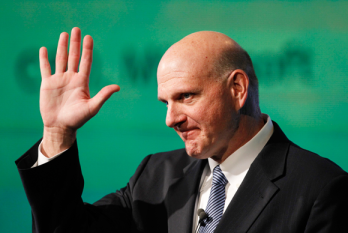 NEWS
NEWS
 NEWS
NEWS
 NEWS
NEWS
![]() Few people will say it, but under outgoing CEO Steve Ballmer’s leadership, Microsoft has been enormously successful, growing and expanding, innovating, raking in billions of dollars for its shareholders. The profits are clear for all to see. Windows and Office continue to be cash cows. On the innovation side of things we’ve seen some brilliant ideas. Windows 8’s interface was a truly radical departure from the old – unfortunately it was so radical that most people ended up hating it with a passion, but just imagine for a second if those metro tiles had been confined to mobile phones and tablets only – would the reaction have been so negative? Or would people embrace Windows 8 as the first genuine rival to Google’s Android?
Few people will say it, but under outgoing CEO Steve Ballmer’s leadership, Microsoft has been enormously successful, growing and expanding, innovating, raking in billions of dollars for its shareholders. The profits are clear for all to see. Windows and Office continue to be cash cows. On the innovation side of things we’ve seen some brilliant ideas. Windows 8’s interface was a truly radical departure from the old – unfortunately it was so radical that most people ended up hating it with a passion, but just imagine for a second if those metro tiles had been confined to mobile phones and tablets only – would the reaction have been so negative? Or would people embrace Windows 8 as the first genuine rival to Google’s Android?
There’s been other innovations too – okay we can forget the Surface RT disaster for a second, but the Surface Pro running full Windows is proof enough that Microsoft knows how to make a decent piece of hardware. As is the Kinect motion sensor on the Xbox, which is fast becoming a genuine replacement for the traditional mouse and keyboard as a means of interacting with our computers and games consoles.
But if things are apparently going so well for Microsoft, why all the criticism of Ballmer? Simply because, things could be going so much better. Despite its booming profits, the company is in a state of disarray, with an assortment of loosely related businesses jumbled together and no clear direction as to where these are going. We’ve got the software, the web services (Bing, Sky Drive etc), games, Skype and others. It’s a messy tangle of different divisions that lack any focus, and Ballmer must take most of the blame for that. One of the problems of Ballmer’s leadership is the company’s habit of acquiring firms without any real idea what to do with them. Take its acquisition of Danger for example, whose most senior employees fled the company within months, including Andy Rubin, who later went on to design and run Google’s Android division.
As Wikibon’s David Floyer correctly stated on ServicesANGLE last week, “The fundamental problem with Ballmer is he’s a classic marketing guy.” He was good at sales for sure, helping to boost Microsoft’s revenues to astronomical levels, but with mobile and the web now eroding Windows’ dominance of personal computing that’s no longer enough. Microsoft now needs a CEO who can capitalize on the company’s innovativeness, and that guy was never going to be Steve Ballmer.
It’ll be a challenge. Microsoft is becoming heavily dependent on the enterprise, and less so on consumer products than ever before. Windows currently accounts for about a quarter of Microsoft’s revenues, yet this figure is steadily falling as more consumers turn to mobile devices. Instead, Microsoft’s enterprise sales, via its Business and Servers & Tool divisions, are the chief factor behind its continuing growth. The only problem with this is that Windows 8 is generally viewed as an unmitigated disaster, alienating corporate IT departments that prefer the reliability and familiarity of traditional enterprise software to radical departures like the touch-centric OS. This means that even Microsoft’s dominance of the enterprise could find itself under threat if something isn’t done.
Microsoft is facing an uncertain future. It’ll still make shed loads of money for the time being of course, but with the PC era slowly coming to a close, the danger is that the Redmond firm won’t manage to establish itself as a player in whatever eventually follows. Whoever takes over from Ballmer is going to have a tough time figuring out how to keep the money rolling in, while at the same time clearing up the mess the previous CEO left behind, and putting its innovation to good use. Certainly, it won’t be an enviable job.
THANK YOU